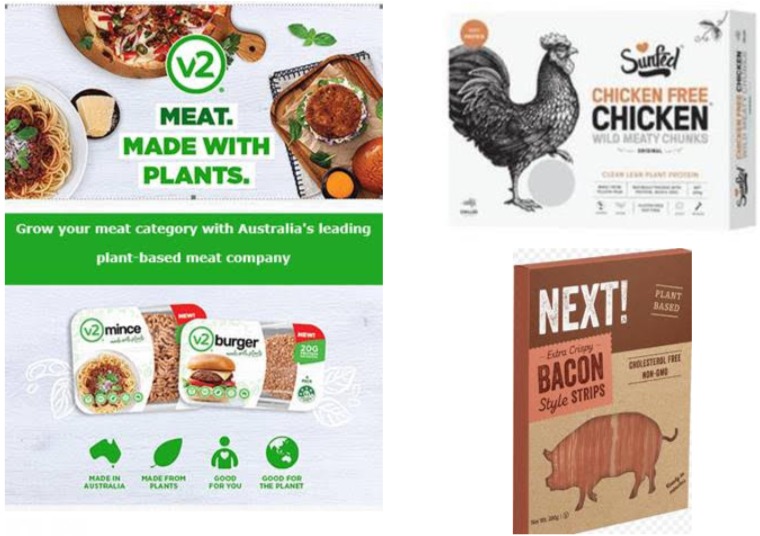
Food labelling like this will be examined in the Senate inquiry.

Sheep Producers Australia CEO Stephen Crisp
SHEEP Producers Australia has welcomed a Senate inquiry into food labelling laws, in a push for minimum standards to protect red meat brands against plant-based and synthetic proteins.
SPA chief executive officer Stephen Crisp said while white meats and beef mince have borne the brunt of labelling issues, the industry has seen that lamb, or sheep meat in general, is also on the ‘substitute’ agenda.
“Lamb cannot call itself beef, or vice versa, if the price is higher on the day, even though we are a lot closer in constitution than anything plant based,” he said.
“These products are not lamb or any type of meat and need to be labelled accordingly.
“This enquiry is exactly what is needed to ensure truth in labelling, and that the red meat sector has the same protections as other industries when it comes to protecting a brand that is expensive to earn and maintain.”
He said SPA congratulated Nationals Senator Susan McDonald on the initiative and implored the whole livestock sector to take a keen interest and contribute where it could.
“The red meat industry is bigger than the processors, butchers, supermarkets, their combined branding, and the cost of complying with regulations.
“There is massive investment from producers through levies, which contributes to funding domestic lamb marketing campaigns like the Meat & Livestock Australia Lamb ads that we enjoy every January,” he said.
“Your everyday producer complies with many regulations and contributes directly to the cost of maintaining our brand.
“Anyone who wants to piggyback on the lamb name is getting a free ride on the back of a sheep producer, and the whole of the supply chain,” Mr Crisp said.
Former butcher and Senator launches inquiry

Senator Susan McDonald.
Senator McDonald launched the inquiry in response to complaints from the Australian red meat industry, to investigate if terms such as “meat-free mince”, “sausage made with plants” and “vegan bacon” pass muster.
The former butcher-shop owner recently helped establish the Parliamentary Friends of Red Meat advocacy group and said it was up to makers of non-meat products to come up with their own distinct terms instead of trading off long-established names of animal proteins.
“There are intellectual property issues, and in our export legislation we have clear definitions of meat being the product of an animal, but there are gaps domestically.
“The industry invests hundreds of millions of dollars each year to develop and enhance the intellectual property and benefits of red meat in Australia, and it’s important that these investments are protected,” Senator McDonald said.
“Just like wine makers wanting exclusive use of some wine names, I feel strongly that our Aussie red meat industry should have sole use of product names that have meant only one thing for centuries,” Ms McDonald said.
Red Meat Advisory Council chairman, John McKillop, said graziers had had enough.
“It is a national disgrace that highly processed plant-based protein made from imported ingredients are allowed to be labelled as Australian meat,” he said.
“Every day 434,000 proud farmers, livestock transporters, meat workers and butchers work together to provide families with natural, nutritious and healthy meat.
“Through droughts, floods and fires, our industry has always been there to supply the safest and highest quality meat to Australian consumers,” Mr McKillop said.
“These highly processed, unnatural plant-based products are increasingly seen as a health risk and are in no way similar to the red meat produced by Australian farmers.
“The brand and reputation of natural beef, lamb and goat has been built over generations and is now being denigrated by companies that are deliberately trying to use piggyback marketing to sell an inferior product,” he said.
“Infringing a trademarked brand to sell another product is unlawful in Australia and so should be the use of our industry’s collective owned meat category brands if a product is not from the flesh of an animal.
“The Australian red meat and livestock industry strongly welcome the announcement of a parliamentary inquiry into meat category branding.
“The status quo needs to be fixed as it is currently failing consumers and Australia’s 434,000 meat and livestock workers.”
The inquiry will investigate the economic effects of non-animal protein marketing on Australia’s red meat industry, the legality of using livestock imagery on vegan products, and the health benefits of non-animal protein manufacturing processes.
“If you prefer tofu over T-bone, then you go for it but forget the ethics of eating animal products, this is about protecting a highly valuable industry and also providing a clear distinction between the real thing and the alternatives so consumers know exactly what they’re getting,” Senator McDonald said.

HAVE YOUR SAY